Lightning strikes to Chicago's skyscrapers: Sears, Hancock & Trump
18-year project documenting upward lightning strikes to Chicago's famous skyscrapers
ABOVE: Chicago Triple Lightning Strike The Sears Tower, Trump Tower and John Hancock Center are all struck by lightning at the same time on June 30, 2014. See more images from this event
SLOW MOTION VIDEO: Four triple strikes in 1500 FPS slow motion - 2020
SLOW MOTION VIDEO: Quadruple, quintuple and sextuple strikes in 1500 FPS - 2023
HD VIDEO: 17 skyscraper strikes in one night - 2014
4K VIDEO: Skyscraper strikes in 2024
HD VIDEO: Skyscraper strikes in 2006 and 2009
|
In September of 2025, my work is generating the most income it ever has in my career. Yet, I'm being forced to shut down my successul operation, against my will, due to one cause alone: 95% of that revenue is being stolen by piracy and copyright infringement. I've lost more than $1 million to copyright infringement in the last 15 years, and it's finally brought an end to my professional storm chasing operation. Do not be misled by the lies of infringers, anti-copyright activists and organized piracy cartels. This page is a detailed, evidenced account of my battle I had to undertake to just barely stay in business, and eventually could not overcome. It's a problem faced by all of my colleagues and most other creators in the field. |
FAQ: Chicago skyscraper lightning FAQ
GALLERY: Chicago Skyscraper Lightning Strike Photos
CHICAGO, IL - Lightning routinely strikes the Sears Tower, the John Hancock building and the Trump Tower during many of the thunderstorms that pass over downtown Chicago. I've been working on an ongoing effort for the past 18 years to document these upward lightning strikes to the skyscrapers. Since 2006, I have made more than 28 separate chases to the city (initially from West Virginia, later from St. Louis) to capture imagery and video. While upward lightning is common and occurs many times per year, it is very difficult to know ahead of time when a storm capable of these type of discharges will pass over the city.
My most successful Chicago chases were the June 30, 2014 event that resulted in a high quality still image of a triple building strike, the August 10, 2020 event which yielded 1500 FPS slow motion video of numerous building strikes and the July 29, 2023 storm that produced more than 20 building strikes, including four, five and six at a time.
Chicago skyscraper lightning photo gallery
The following are images captured during the 17-year project (click each thumbnail to visit the corresponding storm log page and view larger versions). NEW: See the imagery from the July 29, 2023 event!
|
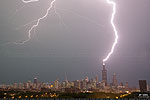 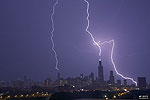 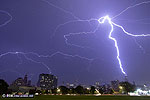  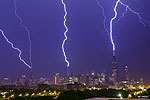   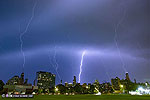  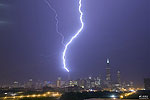 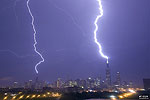 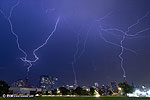 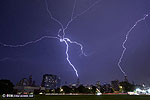  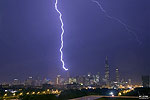 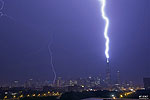 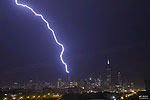 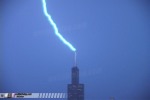 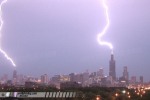  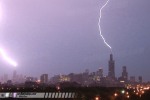 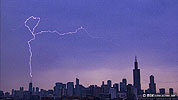 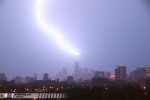 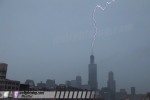  
Chicago skyscraper lightning FAQ
What type of lightning hits the buildings in Chicago?
Most lightning strikes to the three major skyscrapers in Chicago - the Sears Tower, John Hancock, and Trump Tower - are the distinct 'upward moving' or 'ground-to-cloud' lightning. See this detailed article on upward lightning. Conventional (downward) cloud-to-ground lightning can and does also hit the buildings downtown. Strikes to the shorter buildings (other than the tallest three) in the city are typically of the cloud-to-ground variety. In photos, cloud-to-ground lightning will consist of downward branching, while upward lightning will either be branchless or feature upward branching.
This is a short clip of a video shot at 1,502 frames per second of the beginning of an upward lightning flash to the Sears, Hancock and Trump simultaneously. The video shows how the positive leaders begin at the tops of the buildings and propagate skyward:
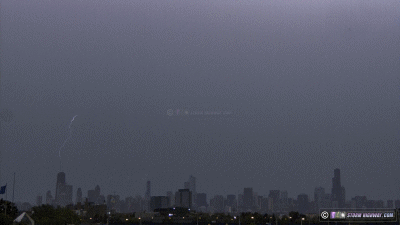
1,502 FPS video of upward lightning (click to watch the full video)
How often do the buildings in Chicago get struck?
Lightning strikes each of the three major skyscrapers in Chicago (Sears Tower, John Hancock, Trump Tower) anywhere from 50 to 100 times per year. It is common for a single thunderstorm to produce 2 or more discharge events to the structures. Events occur a few times a year where the buildings are hit a half a dozen times or more in one storm. Rare storms have been known to produce a dozen or more building strikes! The June 30, 2014 event produced 17 upward lightning flashes to the buildings, the August 10, 2020 event produced at least 13 building strikes and the July 29, 2023 storm produced an incredible 21 strikes!. Can lightning hit more than one building at a time?
Yes - this is a common characteristic of 'upward' lightning. Upward lightning strokes frequently initiate off of multiple tall objects (like towers and skyscrapers) at a time. The three major skyscrapers in Chicago are no different - two or three are routinely struck at one time. In fact, it is actually rare for a storm to not produce at least one double or triple simultaneous strike. The June 30, 2014 event produced two separate triple strike events and two double strikes. The video of the August 10, 2020 event shows several triple building strikes. Rare events can even produce simultaneous quadruple, quintuple, sextuple and even septuple strikes involving other tall buildings including Aon Center and St. Regis Chicago.
While photographers sometimes "stack" multiple lighting strikes into one image (I do this also, where disclosed), most photos and video clips showing two or three of Chicago's skyscrapers getting hit by lightning simultaneously are authentic and accurate (IE, not 'Photoshopped' or comprised of multiple images).
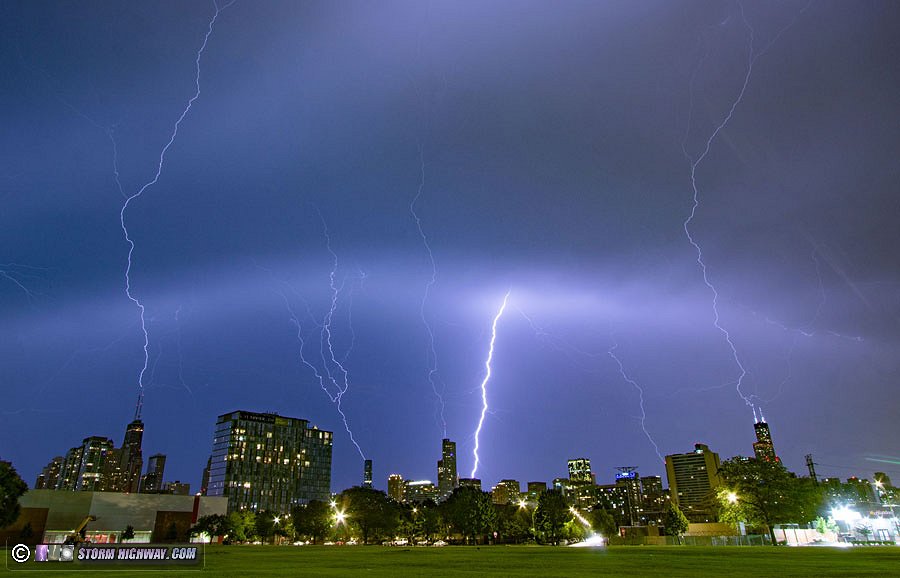
Septuple strike: Sears, Hancock, Trump, St. Regis, Aon, 1000M, & Lake Point Tower
Are the buildings damaged by all of the lightning strikes?
Towers and skyscrapers are designed to handle numerous lightning strikes without ill effect. The current is passed harmlessly through the structure to ground. Most towers/skyscrapers have a lightning conductor 'crown' frame at the top of the spires and antennas that are built to handle direct lightning strikes. When these 'crowns' are struck by lightning, the effect is like a powerful arc welder, producing a shower of sparks and little more than a pit or two on the surface of the metal. See up-close photos of lightning striking a TV tower tip. What are the best storms for seeing lightning striking the skyscrapers?
The storms which produce the most and the best upward lightning strikes to the skyscrapers are strong, mature thunderstorm squall lines (called an MCS or mesoscale convective system) that have a large trailing stratiform precipitation region. The trailing stratiform region is a large area of light rain behind the initial line of storms where long, extensive horizontal lightning discharges occur. When these large in-cloud discharges pass over tall objects like towers, skyscrapers, wind turbines and mountain peaks, they often trigger upward lightning from those objects and structures. You can read more about upward lightning and the storms that produce it here.
< Back to Weather Library
 About the Author: Dan Robinson has been a storm chaser, photographer and cameraman for 34 years. His career has involved traveling around the country covering the most extreme weather on the planet including tornadoes, hurricanes, lightning, floods and winter storms. Dan has been extensively published in newspapers, magazines, web articles and more, and has both supplied footage for and appeared in numerous television productions and newscasts. He has also been involved in the research community, providing material for published scientific journal papers on tornadoes and lightning. |
Related lightning topics:
GO: Home | Storm Chase Logs | Photography | Extreme Weather Library | Stock Footage | Blog
Featured Weather Library Article:
|
|



















































